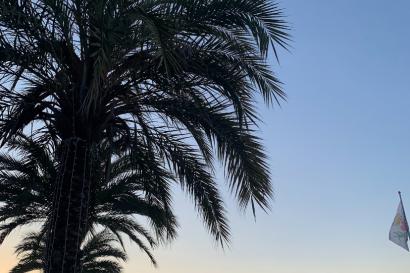Studying abroad is is the time to explore and live your best life, but it can be overwhelming when you're first starting off. Here are a few tips to keep in mind when considering how to begin your adventure.
Do
1) Try all the food, and eat as local as possible
Italy is known for its incredible food and wine, and it’s the perfect time to try it all. If you’re generally a picky eater, now is the time to push yourself and sample everything offered to you. Order the traditional Neapolitan pizza with anchovies. Try out the local pasta, like pici in Siena and tortellini in Bologna. Drink the Chianti wines that make the region famous. Don’t forget about the local markets and shops! Siena has a large Wednesday market where you can get your choice of fresh meats, cheeses, and produce. Be sure to try one of the porchetta paninos, which are sliced from a whole roasted pig. And be sure to visit my favorite wine seller, Pasquale, and many others at the Friday organic market. There you’ll find high quality baked goods, honey, and so many other local goods.
2) Say yes to travel
Traveling within Europe is unbelievable cheap. Using all the budget companies, you can find trains, buses, or even flights for under 50 euros (I booked a 9 euro flight home from Berlin to Bologna during fall break). Hostels are also super cheap, where you can find a bed for 10-20 euros a night, and even make new friends along the way (forever going to love my Dusseldorf squad from Amsterdam). If you can get a large enough group together, AirBnb has huge houses you can rent, and when splitting the cost, it can be incredibly cheap. One warning though, sometimes those budget busses and trains are delayed, so give yourself plenty of time to get between places.
3) Explore the local places and nearby cities
Some of my best experiences came from trying out the local shops and restaurants. Il Pomodorino had the best pizza in Siena, and I’m not ashamed to say I visited at least 4 times during my stay. I became a regular at Cacio e Pere, a bar with live music every night from Wednesday to Sunday. I would take breaks at the Tea Room, an adorable shop with beautiful tea sets and delicious cakes, with an owner who seems so excited to be there every day.
Also, it’s tempting to try and visit every country in Europe, but it can be cheaper, easier, and more rewarding to visit all the places that make your host country so special. Cinque Terre, Venice, Milan, and Naples are just some of the places that I was able to visit in Italy, and each one taught me so much about the culture and history of this incredible country. Even just in the Tuscan region, I explored San Gimignano, Arezzo, Perugia, Amiata, among many others. This isn't to dissuade you from visiting other countries, because I loved visiting Germany for my fall break and taking a weekend to visit Barcelona with IES Abroad, but it is a reminder to explore your home country and see what makes it so special.
4) Try your best to speak Italian and interact with the locals
Learning a new language is hard, especially being when you have no previous experience. Start with learning the basics. I would like a cappuccino is “Vorrei un cappuccino.” How much does this cost is “Quanto costa?” Arming yourself with the necessary words and phrases for a successful café visit or market shopping trip will make your time in Italy feel more comfortable. And don’t be afraid to make mistakes! It’s all part of the learning process, and most of the Italians I met were helpful and helped me figure it out. Even when people would respond back in English, I would try and keep my part of the conversation going in Italian. By the end of the semester, I was comfortable walking into a store where I knew the owners didn’t speak English and getting what I want (keeping Google Translate handy on your phone isn’t a bad idea though, for when you’re really struggling).
5) Take tons of photos and journal (at least for the big events)
I am terrible about daily journaling, I just don’t have to motivation to do it all the time. So instead, I made it my goal that for every bigger trip or event I would put some bullet point notes in my phone, or jot them down in a mini notebook I kept in my backpack. This way, I could keep track of all the places I visited, the sites I saw, and the memories I made, but in a way that I could commit to. Photos are also so important because once the event is over it will be your only way to remember all your crazy adventures. We had some people who were more focused on taking beautiful photographs (shout out to Ara) or fun videos to remember the semester (shout out to Keeley), but I still made sure to capture the scenery, food, and adventures that happened. I even began creating my own “One Second a Day” video to be able to see how much I was able to accomplish in just three months.
Don’t
1) Overpack – minimize your wardrobe and prioritize versatility
One of my biggest regrets coming and going was the amount of stuff I packed in my suitcase. Dragging a 50-pound suitcase through the cobblestone streets of Florence and Siena was painful and time-consuming, and it honestly didn’t need a lot of what I brought. Be realistic with your packing, and keep it versatile. I didn’t plan or book my fall break trip until I was already in Italy, and since I decided to go to Germany I needed to layer up since it’s way colder than Italian fall. The key was having things that went together and could be worn on top of each other to keep warm. Also – pack things you would be fine with leaving abroad. Older running shoes, t-shirts, and jeans, ones that you’ll wear out while abroad and can either donate or throw out at the end are the best options because it clears out space in your suitcase. Be sure to leave yourself room for gifts and souvenirs, because you’ll want to bring back a piece of your home country with you.
2) Dwell on what’s happening at home – but do stay in touch
It’s hard being away from your friends and family, but realize this is a once in a lifetime adventure, and it’s important to be living in the moment. When I spent too much time on Instagram, I felt like I was missing out on so much happening with my friends at home. I would give myself weekend breaks from social media, and delete all the apps off my phone while I was traveling or going to classes during the week. It made me focus on where I was, who I was with, and the adventures I was having. But do call your parents and friends! They want to hear from you and know you’re okay.
3) Overextend yourself
Sometimes you need a break, so don’t feel bad about staying in on a Saturday night, or skipping out on a weekend trip. It’s exhausting to constantly be on the move, and it’s fair to give your body a rest. Take that time to catch up on your school work, take a stroll through your host city, or just catch up on sleep. Don’t forget that you’re only human, getting sick is a risk, and sleep is still important. On that note…
4) Forget you’re studying here
You’re still a student, and it’s important to remember that. It seems tempting to go out with your new friends every night or spend every weekend traveling to different cities and countries. But remember you still have homework, and studying, and responsibilities. Make time for it all, so you don’t end up stressing at the last minute. Your professors are usually understanding that you’re here for adventure and excitement, but they still have rules and guidelines for your educational experience.
5) Eat dinner at 5 pm – or stick to your typical routines from home
Italians eat dinner at 8 pm, something that took a while to adjust to. But it was important to switch to the traditional way since most restaurants don’t become packed or lively until that time, and it was impossible to get the full experience if I was stuck on my habits back at home. I also learned about my love of the apperetivo time, which is basically a time before dinner where you have a prosecco-based drink like an Aperol Spritz or Hugo, and some free snacks (sometimes a lot of free snacks if you go to one of the big buffets). Remember that you’re spending a lot of time in this new country, and the best way to learn is to try living like a local.

Andrea Zelen
<p>I am a senior at the University of Illinois at Chicago, studying Communications and Business Administration. I was born in Serbia but grew up on the north side of Chicago, so I have a major love for the city. I have a passion for food, art, and adventure. I’m always ready to try something new and to see where life takes me, and this semester is my time to try out everything. I’m excited to share my study abroad story and see what excitement awaits me.</p>








